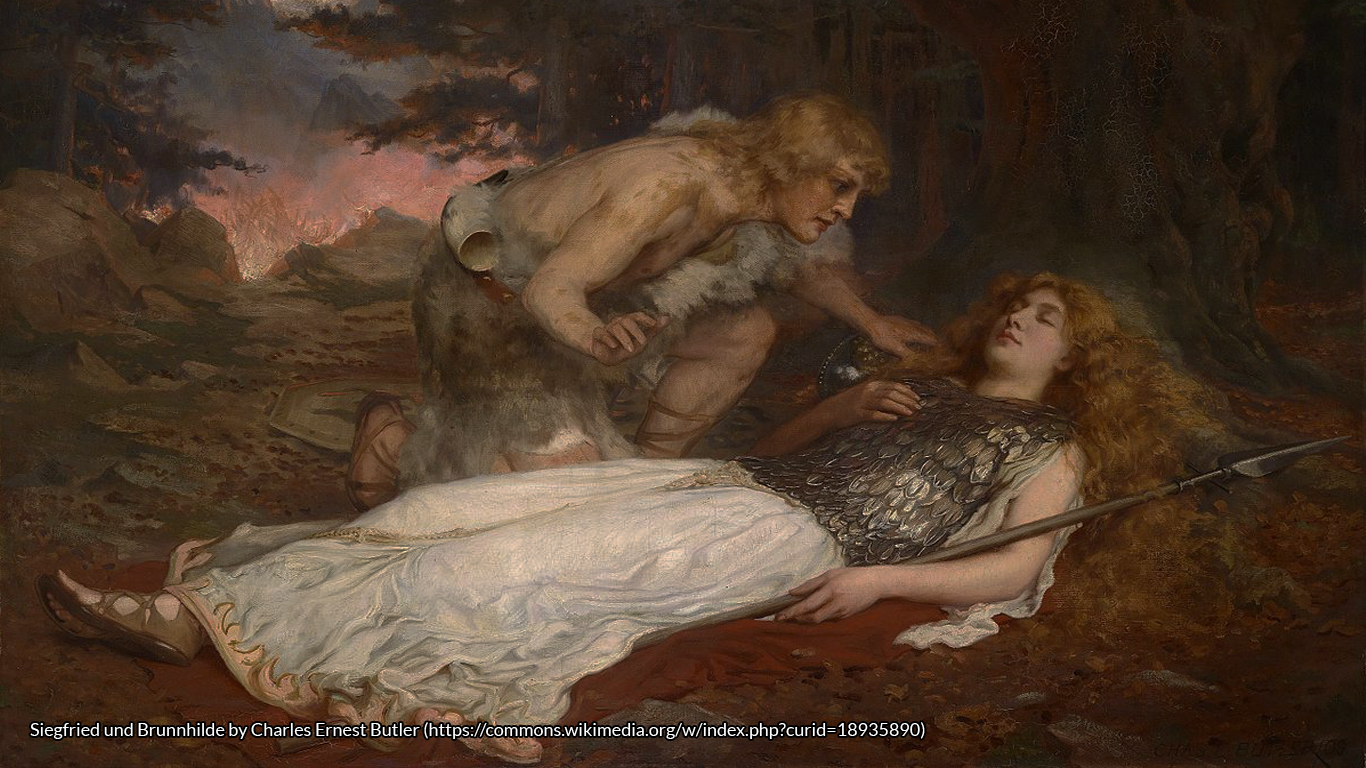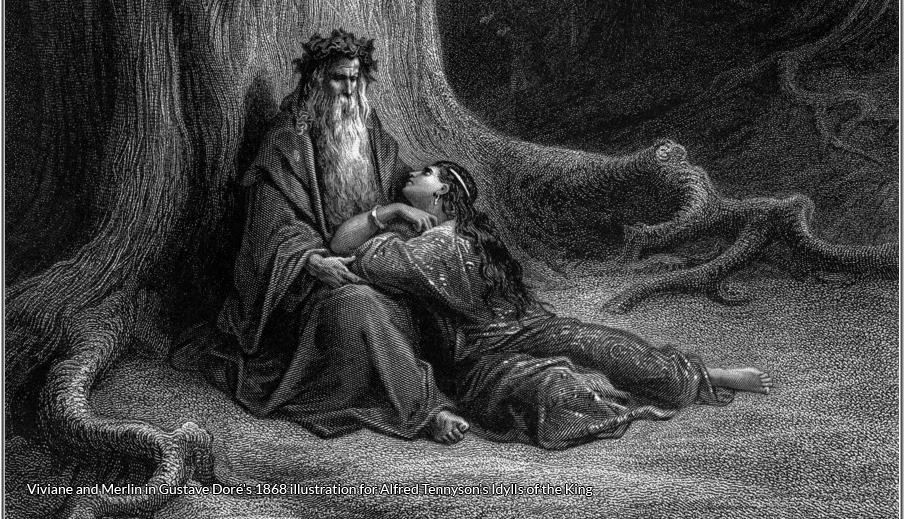There was a wayward young girl who lived in Stanhope, up Weardale, and one day she took it into her head to go off by herself, gathering primroses outside the village along the riverbank. It was a foolish thing to do, for the hills above the river were full of hollows and caves, and everyone thereabouts knew that these were riddled with the hostelries and dancing halls of the fairies.
Even in broad daylight, it wasn’t long before the child heard eerie music playing on pipe, fiddle and drum. The tune was so wild and hauntingly exquisite that she found it quite impossible to ignore. It spun into her head and giddied her around it, until she was compelled to hurl down the bunch of flowers she was clutching and hurry towards it. Madly she stumbled through the bracken stumps and brown heather, and came soon to a gigantic boulder jutting from the hillside. Running down its centre was a gaping fissure.
By now the music was almost deafening: no longer could she hear the wind and the curlews crying. It was so frenzied that the girl couldn’t keep her feet from tapping; her fingers twitched and her head began to nod uncontrollably.
Young as she was, she knew that she must tear herself away, for fear of being lost to this world forever. Yet the pull of the music was too strong for her. ‘Don’t look, come away!’ she cried to herself. But in spite of her fears, she pressed her face to the crack and peered through it. Beyond it, in a thick darkness lit by a mass of flickering, smoking candles, she glimpsed a sight that few have ever seen: more than eighty miniscule people, perfectly formed and richly dressed, yet each no bigger than a hand-width, dancing around the cavern like a swarm of angry bees.
If the crack had been wider or the girl smaller, she would have squeezed through it for sure, but luckily that was impossible. Somehow, she managed to wrench herself away. Scattering her flowers, she ran back down to the valley and along the riverbank until she reached her home.
‘Whatever’s wrong?’ her mother asked when the girl came lurching indoors, for her hair was all dishevelled and her face as white as a sheet.
‘I’ve seen them,’ she whispered, ‘the Little People!’ Weeping and trembling, she told all that had happened.
‘You’re safe from them now,’ the mother tried to comfort her. But when the father came in from the fields, all her terror came seething back, for he certainly didn’t agree.
‘They didn’t see you spying on them?’ he quizzed the girl.
She confessed that she didn’t know.
‘Then we must assume that they did,’ he said gravely. ‘And that means …’ ‘Oh, my precious daughter, we’ve as good as lost you!’
‘How can that be?’ she cried.
‘They’ll come for you,’ the father answered. ‘Haven’t we told you enough times, you foolish child? The Little People can’t bear to be spied on. They’ll snatch you away as soon as they can.’
‘For pity’s sake, ask the wise woman if she can help us!’ the mother urged him.
The father nodded gravely and hurried out through the twilight to a lonely cottage at the far end of the village, covered in twisting briars and tendrils of ivy. He knocked at the door and was beckoned inside by a very old woman.
He told her all that had happened. The old woman stared into the flames of her fire. Then she turned to him and said,
‘They’ll come for her tonight, I reckon. At midnight.’
‘But surely there must be some way to save her?’ he exclaimed.
‘Oh indeed there is,’ she said, ‘and it’s simple enough, yet harder than you might think. For the fairies won’t be able to touch her so long as your house is totally silent. However, should they hear even the slightest whisper, they’ll snatch her away.’
The father was somewhat comforted. He rushed home and sent the girl to bed at once, strictly forbidding her to call or cry out or make any kind of noise. Then the parents went around the house together. They extinguished the fire to be sure there would be no crackling or shifting, jammed all the clocks so that they could not tick, and overfed the dogs and cats until they all fell into a deep, satiated sleep. Finally they bolted the doors tightly and sat down in the cold kitchen to wait.
After a while, though the clocks were all still, they guessed it must be midnight, for they heard the sound of high-pitched, reedy voices, the clinking of bridle bells and the soft clip-clopping of shrunken hooves. A whole troop of fairies came riding into the yard, but the door was shut firmly against them. The mother and father sat still and quiet as corpses, scarcely daring to breathe.
But however much care one takes, something always slips through. When the girl had gone upstairs to hide in her bed, the youngest dog – hardly more than a pup – had sneaked up with her, missing out on the feast that had sent all the others into slumber. Now he lay at the foot of her bed with one ear cocked. When the fairies opened the gate, he began to growl, and as they pranced across the yard, this turned into a frenetic barking.
The parents looked at each other in horror, and went running up the narrow stairs to the room where they had left their beloved daughter. But it was too late, for the protective spell had been broken. The bed was empty.
The child was gone.
The mother wept bitterly all night, but the father went straight back to consult the wise woman. She shook her head when she heard what had happened, but passed no judgement. Instead, she said:
‘It is still not too late to save your daughter, if you dare to visit the fairies’ cave yourself.’
‘Of course!’ the father cried. ‘Anything!’
‘When you go, you must take them three gifts,’ the wise woman went on. ‘Firstly, something that gives light without burning. Secondly, a piece of an animal’s body, which you have taken without shedding even a drop of blood. Thirdly, a chicken that has no bone in its body.’
‘But what does this mean?’ the father cried. ‘My heart is broken: how can you expect me to solve these riddles?’
‘Look and you will see,’ the old woman answered. ‘Listen and you will hear. And wherever you go from now on, carry a rowan sprig with you, for it has power to protect you from malicious enchantments.’
Then she showed the father to the door and shut it firmly behind him.
A spreading rowan tree stood by the wise woman’s garden gate. The father broke a twig from it and put it in his pocket. Then he set off, morosely, along the road to his home.
His thoughts were all befuddled and he wasn’t looking where he was going, so he didn’t see the ragged tramp in his path until they collided. The father offered his apologies and, to make amends, pulled a silver sixpence from his pocket and pressed it into the tramp’s grubby hand. The tramp stared at him with sunken eyes, then beckoned him closer.
‘My fault, too,’ he said. ‘If I take this money, I owe you a favour in return. Is there something I can do for you?’
The father shook his head sadly. ‘I don’t suppose you can solve a riddle for me,’ he said. ‘Can you tell me what gives light without burning?’
The tramp laughed. ‘That’s easy for a man of the road like me. The answer is a glow-worm! I often use one to light my way. Here.’
He reached into the hedgerow, scooped up a small beetle that shimmered with a luminescence so soft it could scarcely be seen, and pressed it into the father’s hand. ‘Whatever you need it for, I hope it works,’ he said, ‘and may good luck be with you.’
They went their separate ways. As the spring sunshine bore down, the father noticed a movement in the grass. A bronze-coloured lizard was struggling to free itself from a twist of wire. He crouched down to free it. As the lizard scurried away, its tail came off in his hand, leaving neither wound nor blood.
Ah, he thought, putting the tail in his pocket, that’s the second riddle solved too.
He continued on his way. In a copse by the roadside, he heard a great squawking. Parting the branches, he saw a thrush besieged by a kestrel. Quickly, he found a pebble and hurled it at the larger bird. As the kestrel flew up and away, the thrush broke into a sweet song, and in the purity of its notes, he seemed to hear these strange words:
Three days by five days
on egg sits hen
chick within
no bones by then.
He hurried home and told his wife all that he had seen and heard. Luckily, one of their hens was already broody, so they set her to sit upon a new-laid egg straight away. When fifteen days had passed, the father took the egg from her nest and added it to the glow-worm and the lizard’s tail that were already in his pocket. Then he set off to the fairies’ cave.
He trod the path his poor, lost daughter had followed, along the riverbank. Like her, he caught the strains of eerie music, and was drawn to the boulder on the hillside, where a crack marked the entrance to the fairy realms. His anguish was enough to banish his fear. Holding the rowan twig firmly in his hand, he roared out above the deafening music:
‘GIVE ME BACK MY DAUGHTER!’
At once the music stopped. In the heavy silence that followed, he put his eye to the fissure and saw the girl. She was dressed in her nightgown, as when he had last seen her, but she was pale as bones now, and held firmly in the grasp of a dozen miniscule hands.
A reedy voice called: ‘What will you give us to get her back, mortal?’
‘I bring you a light that does not burn, part of a creature’s body taken without shedding blood, and a boneless chicken,’ the father answered. He crammed the curious gifts through the crack, pushing hard until he heard each one drop to the floor of the cave.
There was a burst of cackling laughter and a flash of light, and then the crazy music started up again. In despair he turned away, thinking that, after all, he would never get his daughter back.
But then … there she was, standing right behind him, safe, alive and free!
‘The Weardale Fairies’, extracted from English Fairy Tales and Legends by Rosalind Kerven, published by Batsford. Illustration by Arthur Rackham, Mary Evans Picture Library.
Win a set of books by Rosalind Kerven!
The wonderful folks over at Batsford have offered a set of Rosalind’s excellent new book series for a lucky newsletter subscriber this month!*
The definitive book of stories from Arthurian legend.
A unique collection of traditional stories about faeries, elves and goblins.
English Fairy Tales and Legends
12 classic English fairy tales and their history, from tales of dragons to Robin Hood.
*Sign up for the #FolkloreThursday newsletter here to enter our competitions this month (valid August 2019; UK & ROI only).
The books can be purchased here.







